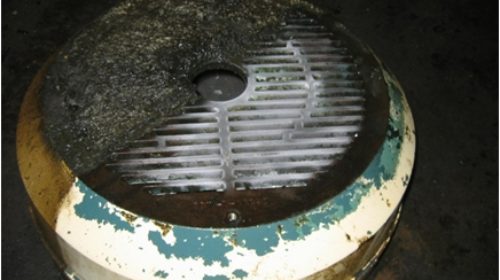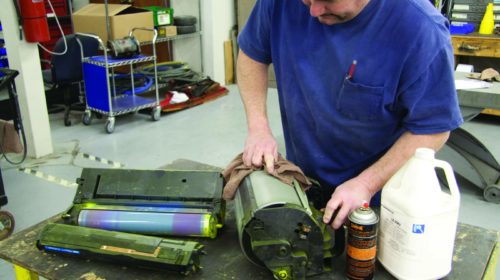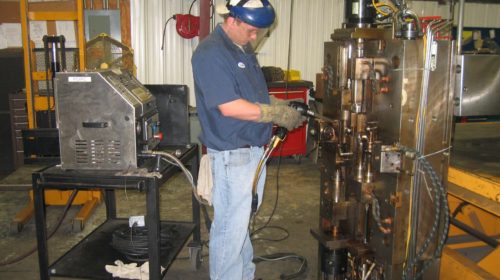
Preform solutions increases production cycles and improves products and profits with dry ice cleaning
THE SITUATION
Preform Solutions in Sioux Falls, South Dakota specializes in the production of quality preforms for the food and beverage, oil, pharmaceutical and cosmetic industries. The small, family-owned business provides custom preform injection molding services for customers across the country, as well as in Canada and Mexico. With the company’s growth in the United States and internationally, its eight injection molding machines are running constantly to meet the demands and deadlines of its growing customer base. As a result of its diversified customers and production schedule, Preform has a lot of mold changeovers, which requires the company to clean its molds after every changeover, and perform regularly scheduled maintenance on its machines to keep them in pristine condition.
THE PROBLEM
“With so many changeovers, we do a lot of cleaning,” said Neil Christopherson, Mold Manager for Preform. “To maintain our quality, we do all our tooling changes and maintenance in house. Quality is critical to our success, so we don’t just put a mold in and then use it until it wears out. We try to maintain our molds and machines so that we can get the maximum life and performance out of them.” In the past after each changeover, Preform used a combination of chemical solvents and an ultrasonic machine to clean its machines and molds. The biggest challenge for cleaning by hand is that Preform employees had to work closely with large, bulky equipment, and razor sharp molds. In addition, the chemicals required workers to use gloves and eye gear to reduce the risk of harming the skin. With the ultrasonic method, Preform had to completely shut down its presses, remove and disassemble the molds, soak the molds in chemicals, rinse them off after the ultrasonic bath, blow out the water with an air hose to reduce the chance of water spots, and then reinstall and warm the mold plates. For a 16 cavity mold, it took Preform more than five hours to clean.”
In addition, the constant production pace combined with the inability to effectively spot clean has presented some production and quality challenges.
“We have regular scheduled maintenance every two weeks during which time we completely clean all the machines and molds,” added Christopherson. “Unfortunately, we have had times in the past when we have been running constantly and we are not able to stop. We didn’t have the capability to spot clean, so we had to wait until the order was finished before we could clean. And in some cases, we did notice quality deterioration.”
In an effort to reduce the time and effort associated with cleaning and maintenance, Preform began looking at new ultrasonic cleaning systems that would allow the company to clean the entire mold, rather than individual parts. For Christopherson, the biggest question was, “What do I do when I have to clean the mold while the job is still running?” In addition, the manufacturer of the ultrasonic cleaning system did not provide demo units, which meant the company would have to buy the system to test it.
THE SOLUTION
After touring several PET plants and working with a mold company that used Cold Jet’s environmentally responsible dry ice blast cleaning systems, Preform requested a demo unit from Cold Jet. A Cold Jet representative demonstrated the system in-house, removing old grease from the injection molding machines.
“The in-house demonstration motivated us to look at the technology seriously for our company,” commented Christopherson. “After some research, we found that Cold Jet was the only company to offer a bench-top unit that would allow us to clean our machines and molds in place. We purchased the i3 MicroClean system, as well as an IcePress.”
The i3 MicroClean dry ice blast cleaning and product finishing system features Cold Jet’s patented shaved dry ice and feeder technologies technology. The precision cleaning system cleans without abrasion and while molds are still hot and in the press, which significantly reduces cleaning time and impact on production. The i3 IcePress complements the MicroClean by creating just-in-time block dry ice from pellets, nuggets and/or scrap dry ice in under three minutes.
Christopherson added, “I would recommend that anyone who buys a MicroClean should also buy an IcePress because quality of ice is very important when it comes to cleaning. Dry ice deteriorates quickly, and with the IcePress, we can make quality ice blocks as we need them.”
THE RESULTS
According to Christopherson, the MicroClean has made cleaning more efficient, allowing workers to spot clean as the jobs are in process; removing PET dust off the finish, thread splits and neck and wear rings, and out of mold cavities. The mobile bench-top MicroClean allows workers to move the system quickly across the production floor to clean when and where it is needed. A thorough mold cleaning with the dry ice blasting system takes Preform less than an hour, while also saving resin and eliminating shut down and start-up times.
“The Cold Jet system has helped make our cleaning and maintenance processes more efficient,” stated Christopherson. “We no longer have to interrupt production cycles to spot clean, which reduces waste and preserves resin. We can simply blow out the parts and keep going.”
Cold Jet’s system allows Preform to be more efficient with its cleaning, adding ongoing spot cleaning to its scheduled maintenance. Because the molds are being cleaned faster and more frequently, Preform can operate its injection molding systems longer and increase the number of production cycles. Together, this translates into more high quality products and more revenue In addition, with the IcePress, Preform can produce high density dry ice blocks on demand, ensuring the cleaning quality of the MicroClean dry ice blasting system. Dry ice blasting supports Preform product quality efforts, improves productivity by reducing prolonged shut-down times and improves worker safety by helping to eliminate exposure to chemical solvents.

